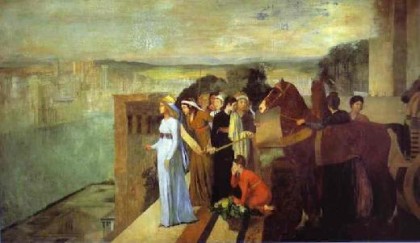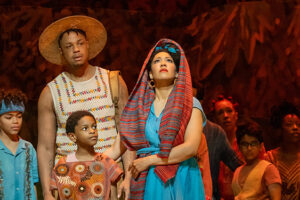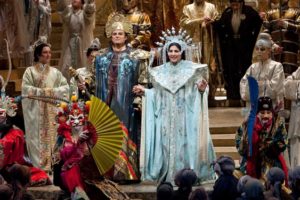
What impressed La Cieca at the Caramoor concert of Semiramide on Friday was not so much the quality of the performance (though that was on a solidly high level) but the magnificence of the work itself. This magnificence stands out now in even greater relief after the comparison with Les Huguenots later in the weekend.
Part of the problem is recordings, I think: we all believe we “know” a work like Semiramidewhen what we mostly know is highlights from skipping around on CDs. There’s also the issue that until fairly recently, nobody had the opportunity to hear a really complete Semiramide. Even the lavishly cast La Scala revival of 1962 (no, La Cieca wasn’t there, and neither were you) chopped out over half an hour of the score. And let’s face it, when you listen to that Scala revival (as you will later this week, when La Cieca programs it on Unnatural Acts of Opera) you’re likely to skip over the “dull” bits to sample the morceaux.
And yet, La Cieca thinks, even though the parts of Semiramide are spectacularly lovely, the sum is something far more impressive, a truly great opera in the grand manner. Semiramidecan afford to take its time (at Caramoor, four solid hours, including a practically instantaneous intermission) because there is so much interesting beauty there, enough to captivate an audience for the whole long evening.
Now, to the performance. La Cieca heard some sort of garbled story about how there were trombones missing or maybe they were horns. Not Marilyn Horne, though I don’t think she was there, but, you know, orchestra horns. This issue was apparently addressed in preshow talk by the phabulously philological Philip Gossett. Of course La Cieca wasn’t there, because it was raining, you know, and there were delays because of the traffic, and once we arrived, even a subtle playing of the “don’t you know who I am” card failed to gain La Cieca’s party access to an indoor space for their by-then somewhat soggy picnic.
But Mr. Gossett goes on at some loving length about Semiramide in his indispensable tome Divas and Scholars: Performing Italian Opera, so La Cieca feels like she was sort of there in spirit, and given, you know, the rain and all, she was probably better off noshing instead of facing the opera on an empty stomach, don’t you think? So, anyway, she did get to the actual performance in plenty of time, and she thinks Will Crutchfield did a very fine job on the podium, and (most of the time) off the podium as well. The “off the podium” part of the proceedings was of course Crutchfield’s musical preparation for the opera including organizing the ornamentation.
For Semiramide, La Cieca thought, the abbellimenti indeed “beautified” the vocal line in almost every case. The “almost” is on account of Angela Meade, the lustrous soprano who performed the title part. Her voice is big and agile for its size; however, like any soprano, there are some things she does better than others. Some (not many) of the ornaments she was given simply didn’t sound all that good in her voice, particularly an intricate set of syncopated curilcues festooned around the coda of “Bel raggio lusinghier.”
That’s quibbling, though (you know La Cieca does like her quibbling) because after “Bel raggio,” Meade’s voice grew more sumptuous and colorful without ever losing the ability to finesse. I particularly admired her ability and willingness to plunge into chest voice at musically and dramatically apt moments, a well-supported tone with a bit of snarl to it.
Vivica Genaux, the Arsace, is a different sort of singer from Ms. Meade, and for that matter from just about anyone else in the world. It’s an idiosyncratic technique that is somewhat distracting to watch because every articulated note is coordinated to some sort of jittery mouth and jaw movement. That said, if you don’t stare at her (or if you don’t watch too closely) the sound and articulation are impressive, and she never seems to tire in a role that goes on and on — longer than Semiramide’s part, I think, and because it lies in so low a register (Arsace’s music, I mean) harder to project.
Lawrence Brownlee was really in his element here, not having to carry a whole show as in L’elisir. It’s a treat to hear a really beautiful voice sing a high Rossini role (in contrast to the capon squawking you get from a lot of the boys), particularly since Brownlee doesn’t sacrifice anything in brilliance of coloratura. This role took him up to at least two easy, ringing high D’s. Though he’s not, I think, a natural “fast” singer, Daniel Mobbs performed the villain role of Assur with dignity and style. Of all the leading singers he made the most of the recitatives.
This performance included a few minutes of “extra” music, mostly a solo arioso for Semiramide as she expires, begging forgiveness and all that stuff sopranos do when they’re dying. It sentimentalizes the ending a bit, but I don’t think that’s necessarily a bad thing. These Assyians are a chilly, distant bunch of people, and it’s a nice contrast to see one of them showing a little vulnerability — even if it takes a stabbing to get her to unbend.
























Comments